This page is part of an opinionated overview of "alt.country" music, with record reviews by me, Joe Sixpack... Naturally, it's a work in progress, and quite incomplete, so your comments and suggestions are welcome.
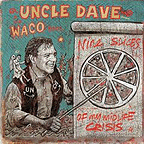 Uncle Dave & The Waco Brothers "Nine Slices Of Midlife Crisis" (Buried Treasure Records, 2004)
Uncle Dave & The Waco Brothers "Nine Slices Of Midlife Crisis" (Buried Treasure Records, 2004)
Mekons/Waco Brothers head honcho Jon Langford produced this ungainly alt-billy outing. It's okay, I suppose, although singer and Mekons confidante "Uncle" Dave Herndon has a markedly unimpressive voice, and his songs are a bit on the obvious side. It's a countrified update of the whole Hazel Adkins joke-a-billy schtick... with plenty of swampy rhythms and chiming rock guitars mixed in with the twang. Didn't do much for me, but for those who are into the Waco Brothers orbit, it's probably a real hoot.
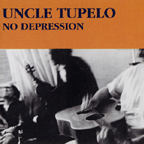 Uncle Tupelo "No Depression" (Rockville Records, 1990/2003)
Uncle Tupelo "No Depression" (Rockville Records, 1990/2003)
An interesting album, with a wild pastiche of styles, though in retrospect, an unlikely locus of the cultish devotion that it has accrued. This is the first album by Uncle Tupelo, a band from the southern Illinois suburbs outside of Saint Louis, and which sported alt.country luminaries Jay Farrar (later of Son Volt) and Jeff Tweedy (later of Wilco). For fans, this is a foundational record: its title track (a cover of an old Carter Family standard) was adopted as the name of the No Depression magazine, which became the self-proclaimed standard bearer of the alt.country scene; the 'zine itself started as an outgrowth of an Internet chat room/fan club devoted to Uncle Tupelo. Personally, I've never been a big fan of the band, nor, for the most part of its various offshoots. But that's probably because I approached them from the perspective of a longtime fan of hard country and honkytonk, and from that vantage point the 1970s, '80s and '90s offered plenty of "alternative" bands that were of infinitely greater interest. But if you came to Uncle T. from an indie rock background, I'm sure they were a great revelation. Mixing angst-ridden grunge rock motifs with crude, enthusiastic twang and shamelessly recycled cowpunk riffs, Tweedy and Farrar were hipsters on a mission, and very much in tune with their times. The sloppiness was willful, the eclecticism a challenge to narrow-minded rock fans, and the nods towards country forebears such as Gram Parsons, et. al. a double-dare throw-down to their regional Midwestern/Southern fan base, who had grown up firm in the belief that country music was redneck crap that cool kids wouldn't touch with a ten-foot pole. Uncle Tupelo echoed numerous bands, ranging from Midwestern heroes like Soul Asylum to Southern indie icons REM, and of course, the melodramatic, bombastic Seattle grunge scene, which was all the rage at the time. I still don't think they were any great shakes from as a hick music combo, but as rockers, they could keep up with the best of them, and it's certainly hard to imagine anyone more emotive and untamed a singer as Tweedy, even with his somewhat mannered faux world-weary vocals. The 2003 CD Sony Music reissue offered six extra tracks -- live performances, demo tracks and outtakes -- as well as casual, informative liner notes by drummer Mike Heidorn, and lots of UT memorabilia, such as reprints of old show posters, advertising the band playing at frat parties and teeny local bars. For devoted fans or the newly curious, this is a pretty classy package.
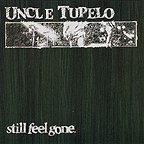 Uncle Tupelo "Still Feel Gone" (Rockville/Sony, 1991/2003)
Uncle Tupelo "Still Feel Gone" (Rockville/Sony, 1991/2003)
Much more of a straightforward rock record than their first album, with the driving rock-garage melodicism of Soul Asylum and other Midwestern bands such as the Magnolias, etc. more in evidence. (Indeed, the band even offers a tribute to the Minutemen ("D. Boon"), which further tips their hand as far as indie/punky influences go...) This album has a more wailing, aggro, abrasive sound that I personally care for, but it seems to fit the soul-searching, self-pitying lyrics, so who am I to complain? As with the reissue of No Depression, this edition sports several bonus tracks, including two radically different demos of "If That's Alright" and an interesting cover of Robyn Hitchcock's "I Wanna Destroy You." Fans will be delighted, but you're expecting something twangy, think again.
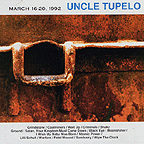 Uncle Tupelo "March 16-20, 1992" (Rockville/Sony, 1992/2003)
Uncle Tupelo "March 16-20, 1992" (Rockville/Sony, 1992/2003)
The all-acoustic sound of their third album is a much-welcome change of pace, and certainly legitimates their status as alt-hick icons. The songwriting, though, is tedious and trite, full of predictable and perposterous references to coal mining, moonshining and whatever other stereotypically "country" motifs that Tweedy and Farrar felt the need to lay claim to. Look, I'm the first to admit that these guys simply can't win with me: I find both their appropriation of traditional themes and their spacy, ill-formed original songs to be equally pretentious. As country music, it simply rings false, while as contemporary rebellious, thinking-person's pop, it also falls a bit short. To their credit, Uncle Tupelo had more depth and capability than many of the "insurgent" alties who came in their wake, and they did seem to have more respect for the hillbilly genre... (For example, the fact that they cover a song by The Louvin Brothers scores them a few points...) Still, I'm mostly unimpressed by the results -- the opening tracks of this album, with Farrar intoning on an old union ballad about confronting the capitalist system, even taken as camp, is little more than laughable. Surprisingly, I actually liked Tweedy's material better than Farrar's (who knew?) and I'll give him credit for having a more original, engaging artistic presence. The overall feel of this record, which was produced by REM's Peter Buck, is more cohesive and moodier than the rock'n'roll clangor of their first two albums, and if you don't think too much about the lyrics, it's a pretty listenable album. For folks who want to check out Uncle Tupelo's rep as a pivotal alt.country band, I'd recommend this as the disc to begin with.
Uncle Tupelo "Anodyne" (Warner Brothers, 1993)
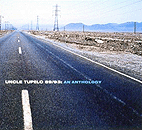 Uncle Tupelo "89/93: An Anthology" (Columbia Legacy, 2002)
Uncle Tupelo "89/93: An Anthology" (Columbia Legacy, 2002)
At a certain point, what with No Depression magazine practically trademarking alt.country music as its very own brainchild, I felt had to go back and give the Uncle Tupelo catalog a good listen, just to see what the fuss was about. I recall there being one album I kind of, grudgingly, enjoyed, but overall... eh. I mean, can see the attraction, I get why people like them, but this ain't my cup of tea. The straight rock numbers were unremarkable and reminiscent of the dozens of REM imitators that popped up in the mid-1980s, and, to be honest, a little tedious. Some of the country-er songs were pretty nice, every once in a while the band would hit a nice groove, and get a little swing into their step that was nice to listen to. But overall, Uncle Tupelo was a band that was far too conscious of their image and the forced profundity that they tried so hard to project into their writing. Jeff Tweedy remains one of the most colossally overweening, egotistical and irritating musicians I have ever heard, and you can hear enough of his smug pretentiousness coming through in these early recordings to warn you off of Wilco and other Tweedy-related outings. This rock-heavy best-of collection is good for what it is, but I'd recommend you look for their individual albums instead, since some are better than others, and that will also give you a better chance to track their artistic growth and evaluate the band.
Alt.Country Albums - Letter "V"


Hick Music Index

 Uncle Dave & The Waco Brothers "Nine Slices Of Midlife Crisis" (Buried Treasure Records, 2004)
Uncle Dave & The Waco Brothers "Nine Slices Of Midlife Crisis" (Buried Treasure Records, 2004)
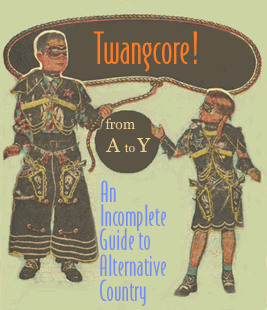
 Uncle Tupelo "No Depression" (Rockville Records, 1990/2003)
Uncle Tupelo "No Depression" (Rockville Records, 1990/2003)
 Uncle Tupelo "Still Feel Gone" (Rockville/Sony, 1991/2003)
Uncle Tupelo "Still Feel Gone" (Rockville/Sony, 1991/2003)
 Uncle Tupelo "March 16-20, 1992" (Rockville/Sony, 1992/2003)
Uncle Tupelo "March 16-20, 1992" (Rockville/Sony, 1992/2003)
 Uncle Tupelo "89/93: An Anthology" (Columbia Legacy, 2002)
Uncle Tupelo "89/93: An Anthology" (Columbia Legacy, 2002)


